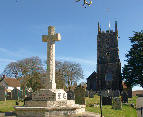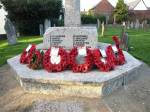Alfred Brealey’s name does not appear on the Roll of Honour that is preserved in Winkleigh church, but in spite of this his name has been added on this site to those Winkleigh men and women who served, because he was in some way associated with the village. The Ashreigney Deanery Magazine for October 1914 reported that the list of volunteers from Winkleigh was growing and that among those who were coming forward were a number who were not considered suitable for medical reasons. All those listed were soon enlisted, however, and among them was Alfred Brealey, who in the November edition of the magazine is reported as having passed his medical and was awaiting his call-up.
Alfred was born and grew up in Exeter. His father John was a brushmaker, also born in Exeter, who had married Sophia Snellgrove in 1878. Sophia was of British descent but had been born at Madras, India. Alfred was the last of eight children and at the time of the 1911 census was still living at the family home at 23 Cowick Road, St. Thomas in Exeter. He was an errand boy for a boot shop until he had experience to get better employment, possibly away from home. However, it is his home address that is on all his service record documents, from his enlistment to his demobilization. At the time of his enlistment in Exeter on December 12th 1914, Alfred Brealey was working as a gas fitter for the Great Western Railway, with whom he must have taken an apprenticeship. It may have been that this work brought him to the Winkleigh area in support of the Exeter to Barnstaple line for a while, and having made friends with other young men in Winkleigh, he attempted to join up with them.
We are indeed fortunate that Alfred’s military records have survived the London blitz which destroyed those of so many others. We have besides the medal card, 8 documents and from these we can trace the story of Alfred’s war service, first in India, then Aden, before his demobilization at Fovant on 9th June 1919. The Attestation document, dated 13th August 1914, further reveals that Alfred was unmarried and that his original number 1690 with which he was first registered for service with the 6th Devons was now changed to 2996: having been rejected by the infantry (standing 5ft 4 1/2”, and in excellent health, possibly on account of height), Alfred had volunteered instead for the 4th Wessex Brigade (Territorial Force) Royal Field Artillery of the same division, the 43rd Wessex Division. He was posted for training to the 1105th Battery, 218 Brigade. .
The original pre-war 4th Wessex Brigade attached to the 43rd Division was armed with 15lb field guns, dating from the campaigns in the Soudan and South Africa. It was not until July 1916 that the 4th Wessex Brigade received their replacements, the 18lb field guns.
The Wessex Division was a formation of the Territorial Force. It was formed as a result of the reforms of the army carried out in 1908 under the Secretary of State for War, Richard Burdon Haldane and was one of 14 Divisions of the peacetime TF. The units of the Division had moved to their annual summer camp on Salisbury Plain in late July 1914 when War Office instructions arrived for precautionary measures to be taken. On 3 August the brigades moved to defended ports while Divisional HQ was established at Exeter. All units were mobilised for full time war service on 5 August 1914. Five days later the Division re-concentrated at Salisbury Plain and HQ moved to Tidworth. On 22 September 1914 the Government of India had agreed to send 32 British and 20 Indian regular army battalions to Europe in exchange for 43 TF battalions. Lord Kitchener proposed instead to send the Wessex Division. The entire Division was to go, with the exception of the staffs of the infantry brigades, the ammunition columns of the artillery brigades, the Royal Engineers, the Royal Army Medical Corps and the Hampshire Heavy Battery, RGA.
All units assembled at Southampton on 9 October. Sailing via Malta and Suez, the main body of the Division went to Bombay, landing on 9 November, with three units (4th, 5th and 6th Devons) landing at Karachi two days later. In 1916 many units of the 43rd Division were transferred to Mesopotamia (including the 4th, 5th and 6th Devons) but their artillery remained in India until 1917 when various units were posted to Palestine, Mesopotamia and Aden. Alfred Brealey was very fortunate: the 218 Brigade was destined for Aden.
Alfred was originally enlisted as a Driver (each gun was drawn by 6 horses with three drivers). On 30th January 1915 he was promoted to Bombadier (the equivalent of Corporal), but was demoted and reduced to Gunner on 12th June 1916. His crime sheet has not survived so we do not know the cause of this mishap.
On January 1st 1917 1105 Battery of 228 Brigade was transferred to the regular army, prior to the move to Aden. Alfred was given his third number, 866034. Here he was to remain safely until the end of the war. Demobilisation was slow, but on February 13th 1919 Alfred was promoted, to acting unpaid Lance/Bombadier, with a further promotion to acting paid Lance/Bombadier on 1st March. He was not demobilised until 13th May 1919 having returned home to Fovant, and finally disembodied on 9th June 1919. His Protection Certificate records him as Gunner, 1105 Battery, still residing at the St.Thomas Exeter address to which he requested his decorations should be sent. He was awarded the Victory and British medal.
Alfred eventually moved to Bristol where he married Elsie Nellie Richards. They had two children, a daughter and a son, of whom the son is believed to be still living. Alfred died in Bristol on 11th October 1951 just over four years before his wife.
16 July 2011


